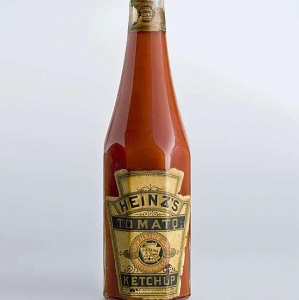U.S. companies began mass-producing tomato ketchup in the late 19th century. Food scientists at H.J. Heinz Company in Pittsburgh developed a balance of sweet, sour, and salty flavor that was popular but difficult for others to reproduce, making the Heinz the leading producer of America’s favorite condiment.
The company was instrumental in developing, perfecting, and promoting sanitary production methods, not only for its ketchup but for the dozens of products it manufactured. Heinz also helped standardize bottle and can sterilization, insisted on strict rules of cleanliness, and even pushed for sanitary food processing legislation. Other big food processors followed Heinz’s lead.
The demand for ketchup also helped drive innovations in plant breeding and mechanical harvesting, two major changes in modern agriculture.
Read more in “How Ketchup Revolutionized How Food Is Grown, Processed and Regulated” by Amy Bentley on the Smithsonian website (2018).








